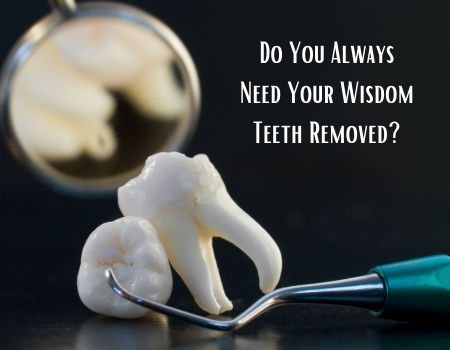Wisdom teeth are the third set of molars located at the back of the mouth, typically emerging between the ages of 17 and 25. Many people associate wisdom teeth with surgery and removal, but does everyone actually need to have their wisdom teeth taken out? The answer varies depending on each individual’s oral health, dental alignment, and how the teeth develop.
What to Know About Wisdom Teeth
Wisdom teeth are the third set of molars that were once essential for our ancestors’ diets. Early humans ate a rougher diet, consisting of raw plants, nuts, and tough meats that required significant chewing power. Having additional molars helped in breaking down such food. Over time, human diets and jaw sizes evolved, making these teeth less useful. However, evolutionary changes have not completely eliminated teeth, and they still emerge for most people, often causing various dental challenges due to lack of space in modern, smaller jaws.
- Do All Wisdom Teeth Need Removal?
Not everyone requires tooth removal. Here’s why:
– No Pain or Discomfort: If wisdom teeth emerge without causing pain, discomfort, or crowding, they may not need to be removed. Some people’s wisdom teeth come in straight and fit well with the rest of the teeth.
– Proper Alignment: Teeth that grow in alignment with other teeth, without shifting or causing crowding, are typically safe to keep. Regular check-ups and X-rays can help monitor any shifts or changes.
– Easy to Clean: When wisdom teeth fully emerge in a way that allows easy access for brushing and flossing, they can be kept with minimal risk of decay or infection.
However, it’s essential to have teeth evaluated by a dentist, as potential issues might still arise later, even if they initially seem trouble-free.
- Reasons for Wisdom Teeth Removal
While not all wisdom teeth need removal, there are common reasons why many dentists recommend it. Some primary factors include:
– Impaction: Impacted wisdom teeth fail to fully emerge due to lack of space or odd angles, leading to various problems. They may press against neighboring teeth, causing pain, or grow in ways that can damage surrounding roots or bone structure.
– Crowding: Even if a wisdom tooth is not impacted, it can crowd adjacent teeth, causing misalignment. If you’ve had orthodontic work, such as braces, wisdom teeth could disrupt that alignment.
– Infection and Inflammation: Partially erupted teeth can create pockets in the gums where bacteria thrive, leading to infections, pain, and inflammation known as pericoronitis. This condition can be recurrent and may lead to further dental issues.
– Tooth Decay and Gum Disease: Because wisdom teeth are positioned far back in the mouth, they’re often harder to clean thoroughly. This increases the risk of tooth decay and gum disease, both of which can spread to surrounding teeth if left untreated.
– Cysts or Tumors: In rare cases, impacted teeth can develop cysts or tumors, which can damage the jawbone and adjacent teeth. While this is uncommon, it’s a risk that dental professionals monitor closely.
- What Happens If You Keep Them?
Keeping your teeth can sometimes be a valid choice, especially if they’re healthy and well-aligned. However, there are some potential drawbacks and ongoing monitoring that’s often recommended:
– Regular Check-Ups and X-Rays: Even if your wisdom teeth are not currently causing issues, regular dental check-ups are essential to ensure that they remain healthy and properly aligned. Dentists may recommend periodic X-rays to track potential changes.
– Increased Risk of Dental Problems: Since wisdom teeth are hard to reach and clean, even well-aligned ones have a slightly higher risk of decay or gum disease. Good oral hygiene, including careful flossing around the wisdom teeth, becomes particularly important.
– Potential for Future Problems: Sometimes, wisdom teeth that were initially harmless may begin to cause issues later in life. For example, impacted teeth might remain dormant but could shift or cause pain years down the line. Remaining vigilant about oral health and changes can help detect and manage any late-onset issues.
- Factors to Consider When Deciding on Removal
When deciding whether or not to remove your wisdom teeth, consider the following:
– Age: Younger patients, typically teenagers and those in their early twenties, tend to heal faster and experience fewer complications after surgery. This is why dentists often recommend removal before the teeth fully emerge in adulthood, as bone tissue around the teeth becomes harder with age, potentially leading to a more complicated extraction.
– Oral Health History: If you have a history of dental issues, such as gum disease or tooth decay, wisdom teeth might add to these problems. Those with pre-existing dental concerns may benefit from early removal.
– Dental X-Rays and Professional Opinion: Your dentist or oral surgeon can assess the current state of your teeth through X-rays, determining their alignment, depth, and potential for future issues. Getting multiple opinions can also help in making an informed decision.
– Symptom Presence: Pain, swelling, or any signs of infection or discomfort around your wisdom tooth area are clear indicators that a dental evaluation is necessary. Some people experience minimal symptoms despite underlying issues, so regular dental visits are crucial.
Tooth removal is a common procedure, but it’s not necessary for everyone. If your wisdom teeth are healthy, aligned, and easy to clean, you may not need to worry about extraction. However, impacted or poorly aligned wisdom teeth can lead to numerous dental issues, making removal a practical choice. Consulting with a dental professional at Fountain Valley Dental, staying on top of your oral hygiene, and keeping up with regular check-ups can help you make the best choice for your long-term dental health.
